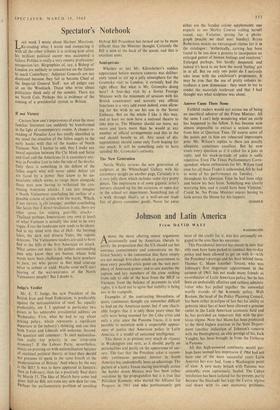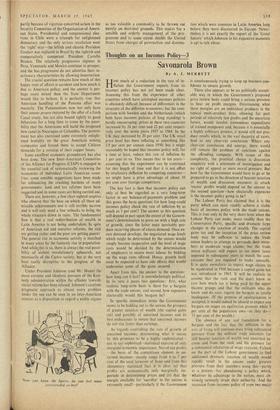Johnson and Latin America
From DAVID WATT
WASHINGTON
AMONG the more alluring minor arguments occasionally used by American liberals to justify the proposition that the US should cut her overseas commitments and concentrate on the Great Society is the contention that there simply are not enough first-class minds in government to man every possible crisis point on the vast peri- phery of American power; and as one watches the captain and key members of the crew rushing from side to side of the boat from the MLF to Vietnam, from the balance of payments to civil rights, it is hard not to agree that stability is being lost in the stampede.
Examples of the contrasting blessedness of quiet, continuous thought are somewhat difficult to find on the American scene, but if one charit- ably forgets that it is only three years since the rafts were being manned for the Cuba crisis and only a year since the Panama fracas, it is now possible to maintain with a respectable appear- ance of justice that American policy in Latin America is a model of sustained intelligence.
This thesis is at present very much de rigueur in Washington and rests, as it should, partly on personalities and partly on the appearance of sue-' cess. The fact that the President takes a reason- ably continuous personal interest in South America has undoubtedly been an advantage. The picture of a lanky Texan staring yearningly across the border down Mexico way' has been rather overdone by the propagandists but it is true that President Kennedy, who started the Alliance for Progress in 1961 and who posthumously gets
most of the credit for it, was less personally en- gaged in the area than his successor.
This Presidential interest has meant in turn that able men have been picked to conduct day-to-day policy and been allowed to get on with it--with the President's prestige and his boot behind them. Thomas C. Mann (another Texan), who was Johnson's first important appointment in the autumn of 1963, has not made many friends as co-ordinator of Latin American policy, but he has been an undeniably effective and ruthless adminis- trator who has pulled together the somewhat woolly strands of ' the Kennedy policy. Walt Rostow, the head of the Policy Planning Council, has been rather in eclipse of late but his ability to generate ideas has at least been allowed a genuine outlet in .the Latin American economic field and he has provided an important link with the pre- vious regime. Now that Mann has been promoted to the third highest position in the State Depart- ment (another indication of Johnson's concern with the Hemisphere), an able protege of his, Jack Vaughn, has been brought in from the Embassy in Panama.
All this high-powered continuity would per- haps have seemed less impressive if 1964 had not been one of the most successful years Latin America has ever had, from a Washington point of view. A very nasty breach with Panama was amicably, even rapturously, 'healed. The cuban revolution has been isolated for the present, partly because the blockade has kept the Castro regime tied down with its own economic problems, partly because of vigorous concerted action in the Security Committee of the'Organisation of Ameri- can States. Presidential and congressional elec- tions in Chile were a triumph for enlightened democracy and the only serious revolution went the `right' way—the leftish and chaotic President Goulart was replaced in Brazil by the rightish and comparatively competent President Castello Branco. The relatively progressive regimes in Peru, Venezuela and Mexico continue to prosper, and the less progressive do not advertise their re- actionary characteristics by allowing insurrection.
The crucial question remains how much of this happy state of affairs is accident and how much is due to American policy; and the answer is per- haps more mixed than the State Department would like to believe. It is perfectly true that American handling of the Panama affair was masterly. The Panamanians now not only have their amour propre restored by the offer of a fresh Canal treaty, but are also bound tightly to good behaviour for a long time to come by the possi- bility that the Americans will build the proposed new canal in Nicaragua or Colombia. The govern- ment has also exercised some extremely enlight- ened brutality on the great American mining companies and forced them to accept Chilean demands for a revision of their copper leases.
Some excellent economic groundwork has also been done. The new Inter-American Committee of the Alliance for Progress (C1AP) is engaged in the essential task of systematically reviewing the economies of individual Latin American coun- tries; some sensible suggestions have been made for refinancing the crushing burdens of many governments; land and tax reforms have been suggested and in some cases are being carried out.
There are, however, a few clear-sighted sceptics who observe that the base on which all these ad- mirable achievements rest is still terribly narrow and it will only need a few setbacks to bring the whole structure down in ruins. The fundamental flaw is that a real redistribution of wealth in Latin America is not being undertaken. In spite of American aid and tentative reforms, the rich are getting richer and the poor are getting poorer. The general rise in economic activity is matched in many areas by the fantastic rise in' population. And while.this is so, there is always the real possi- bility of violent revolutionary upheavals, not necessarily of the Castro variety, but at the very least vastly disruptive to the progress of the Alliance.
Under President Johnson (and Mr. Mann) the more extreme and idealistic pressure of the Ken- nedy administration within the alliance towards social reform has been relaxed. Johnson's cautious Pragmatic approach to almost every problem under the sun can be seen in an inter-American context as a disposition to regard a viable regime
'Now you know the figures, do you feel more overcrowded, or less?'
as too valuable a commodity to be thrown out merely on doctrinal grounds. This makes for a sensible and orderly management of the pro- gramme and to some extent shields the United States from charges of paternalism and domina- tion which were common in Latin America long before they were discovered in Europe. Never- theless it is not exactly the export of the `Great Society' which Johnson in his expansive moments is apt to talk about.



































 Previous page
Previous page